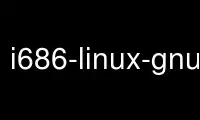
This is the command i686-linux-gnu-ranlib that can be run in the OnWorks free hosting provider using one of our multiple free online workstations such as Ubuntu Online, Fedora Online, Windows online emulator or MAC OS online emulator
PROGRAM:
NAME
ranlib - generate index to archive.
SYNOPSIS
ranlib [--plugin name] [-DhHvVt] archive
DESCRIPTION
ranlib generates an index to the contents of an archive and stores it
in the archive. The index lists each symbol defined by a member of an
archive that is a relocatable object file.
You may use nm -s or nm --print-armap to list this index.
An archive with such an index speeds up linking to the library and
allows routines in the library to call each other without regard to
their placement in the archive.
The GNU ranlib program is another form of GNU ar; running ranlib is
completely equivalent to executing ar -s.
OPTIONS
-h
-H
--help
Show usage information for ranlib.
-v
-V
--version
Show the version number of ranlib.
-D Operate in deterministic mode. The symbol map archive member's
header will show zero for the UID, GID, and timestamp. When this
option is used, multiple runs will produce identical output files.
If binutils was configured with --enable-deterministic-archives,
then this mode is on by default. It can be disabled with the -U
option, described below.
-t Update the timestamp of the symbol map of an archive.
-U Do not operate in deterministic mode. This is the inverse of the
-D option, above: the archive index will get actual UID, GID,
timestamp, and file mode values.
If binutils was configured without --enable-deterministic-archives,
then this mode is on by default.
@file
Read command-line options from file. The options read are inserted
in place of the original @file option. If file does not exist, or
cannot be read, then the option will be treated literally, and not
removed.
Options in file are separated by whitespace. A whitespace
character may be included in an option by surrounding the entire
option in either single or double quotes. Any character (including
a backslash) may be included by prefixing the character to be
included with a backslash. The file may itself contain additional
@file options; any such options will be processed recursively.
Use i686-linux-gnu-ranlib online using onworks.net services